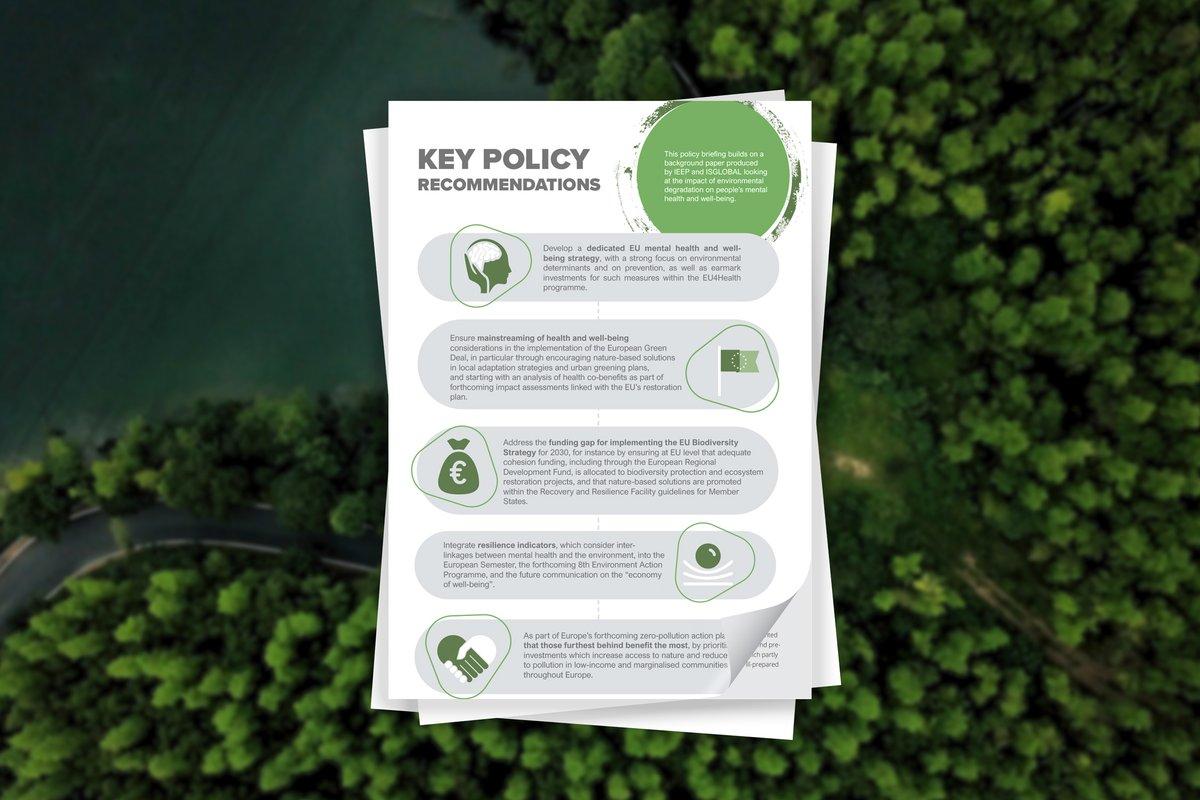AUTHORS: Céline Charveriat – Bartosz Brzeziński – Tsvetelina Filipova – Oriana Ramirez-Rubio (ISGlobal)
This briefing by IEEP and ISGlobal explores how European policies and the COVID-19 recovery efforts can better reflect the impact of the natural environment on people’s mental health.
Access to nature can have immensely positive effects on people’s mental health, according to a growing body of evidence. Likewise, environmental degradation, including climate change and pollution, poses a serious threat to our emotional state and well-being.
On the basis of a background paper by the Institute for European Environmental Policy (IEEP) and the Barcelona Institute for Global Health (ISGlobal), this briefing provides decision-makers with recommendations for how to reflect the links between mental health and the state of the natural environment in policies, particularly in the context of the COVID-19 crisis.
Key findings
- Access to nature: Spending time in nature helps reduce anxiety, depression, and loneliness, while a lack of green space is associated with increased symptoms (Maas et al., cited in Ganzleben and Marnane 2020).
- Climate-related disasters: The consequences of climate change and related adverse weather events can have a profound impact on mental health (Berry et al 2010). Up to three-quarters of people affected by floods have experienced mental health problems, and older people, in particular, experience higher severe levels of stress (Menne and Murray, cited in Ganzleben and Marnane 2020).
- Air pollution: Scientific evidence shows an emerging association between certain air pollutants and a range of mental health outcomes including depression, anxiety, psychosis, dementia, childhood cognitive development (King 2018).
- Chemical pollution: There is a positive association between environmental chemicals and child behaviour disorders (Philippat et al 2017)
- Noise pollution: High levels of environmental noise are associated with mental health symptoms such anxiety, stress, nervousness, nausea, headache, emotional instability, argumentativeness, sexual impotence, changes in mood, increase in social conflicts, neurosis, hysteria, psychosis. (Goines and Hagler 2007), and suicide (King 2018).
- Inequalities: Living in areas with green spaces significantly reduces income-related health inequalities, counteracting the effect of deprivation (Mitchell and Popham, cited in Ganzleben and Marnane 2020), but minorities and people living in deprived communities are less likely to have access to such spaces (ten Brink et al 2017).
Key policy recommendations
- Develop a dedicated EU mental health and well-being strategy, with a strong focus on environmental determinants and on prevention, as well as earmark investments for such measures within the EU4Health programme.
- Ensure mainstreaming of health and well-being considerations in the implementation of the European Green Deal, in particular through encouraging nature-based solutions in local adaptation strategies and urban greening plans, and starting with an analysis of health co-benefits as part of forthcoming impact assessments linked with the EU’s restoration plan.
- Address the funding gap for implementing the EU Biodiversity Strategy for 2030, for instance by ensuring at EU level that adequate cohesion funding, including through the European Regional Development Fund, is allocated to biodiversity protection and ecosystem restoration projects, and that nature-based solutions are promoted within the Recovery and Resilience Facility guidelines for Member States.
- Integrate resilience indicators, which consider interlinkages between mental health and the environment, into the European Semester, the forthcoming 8th Environmental Action Programme, and the future communication on the “economy of well-being”.
- As part of Europe’s forthcoming zero-pollution action plan, ensure that those furthest behind benefit the most, by prioritising investments which increase access to nature and reduce exposure to pollution in low-income and marginalised communities throughout Europe.


